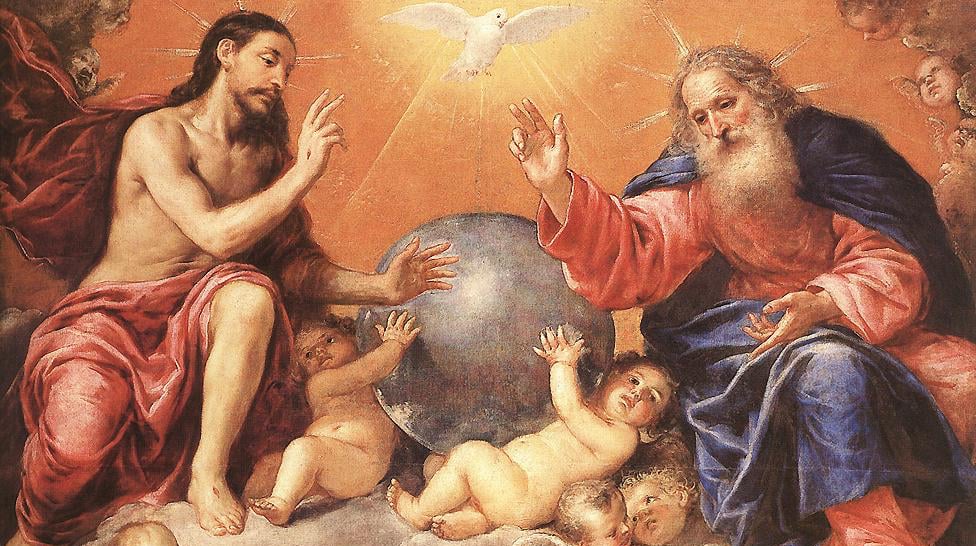About fifty years ago, in the unsettled and confusing times following the Second Vatican Council when it seemed everything was changing or up for grabs, some priests and deacons—wanting to be trendy—changed the words used when baptizing. Instead of the Trinitarian formula, as given in the Gospel of Matthew (28:16-20), they baptized infants “In the Name of the Creator, the Redeemer, and the Sanctifier”—but these baptisms were not valid, meaning they didn’t count, and later had to be repeated correctly. Last year there was a similar story here in the Archdiocese of Detroit that received national attention. A young priest was watching a family video of his own baptism, which had occurred years earlier when he was an infant. To his shock and dismay, he saw that the deacon performing his baptism did not use the correct baptismal formula, which begins “I baptize you. . . .” Instead, he said, “We baptize you in the Name of the Father, and of the Son, and of the Holy Spirit” —a personal variation the deacon had been using for years. The priest consulted with the Archdiocese, and his fear was confirmed: his baptism was invalid, as was that of everyone else baptized by that deacon. This also meant the priest had never actually received any of the sacraments, including ordination, and that all the Masses he had said, all the confessions he had heard, and all the weddings he had presided at didn’t count, either. It was necessary for this unsuspecting young man whom everyone believed to be a priest to be baptized correctly, and then receive Communion, Confirmation, and be ordained a priest once again. It was also necessary for the Archdiocese to try to reach, through public announcements and a search of sacramental records, all the persons who had supposedly received sacraments from him, so that they could receive these sacraments once again, this time validly—all because a someone had taken it upon himself to change one little word of the baptismal formula.
Even though this might seem like a theological technicality or overreaction, the Church takes the Trinitarian formula very seriously; when it comes to something as crucial for salvation as baptism, it’s essential that we get it right. There are many points of Church doctrine and practice that we can leave to the Scripture scholars, canon law experts, and theologians, including an explanation or description of how there can be Three Divine Persons in One God. What we do have to understand and proclaim, however, is the truth that God is love, and that as the Most Holy Trinity of the Father, Son, and Holy Spirit, He invites our loving response—and unless we get this right, we won’t ultimately be happy, and we will not fulfill our mission in life.
Because of original sin, life is much harder than it was intended to be—but, because of God’s loving presence and blessings, it’s still possible to become holy and find true happiness and fulfillment. In the Book of Deuteronomy (4:32-34, 39-40), Moses reminded the Israelites of the wonders the Lord had worked on their behalf, and then urged, “You must keep His statutes and commandments . . . that you and your children after you may prosper. . . .” This relationship with God, of course, is to be based on love. St. Paul (Romans 8:14-17) tells us, “You did not receive a spirit of slavery to fall back into fear, but you received a Spirit of adoption,” allowing us to call God our Father while living as His children and as heirs to His Kingdom. Through Jesus, we are able to know, love, and serve God personally—but this is not a gift or privilege to be kept to ourselves. In the Gospel of Matthew (28:16-20), Our Lord makes it very clear that His followers are to help spread the Good News of salvation throughout the world, making disciples of all peoples and nations. If our hearts truly are open to God’s love, we must do what we can to share this love with others.
God the Father is the Creator, God the Son is the Redeemer, and God the Holy Spirit is the Sanctifier—but these terms aren’t personal enough. We can only understand God on the basis of love, and love requires us to refer to the Three Persons as Father, Son, and Holy Spirit. How there can be Three Persons in One God is a theological mystery—but it’s a mystery rooted in love, and so it can only begin to make sense if we respond to God in a loving manner. We know that God loves us, even though there is nothing we can do on our own to earn or be worthy of this love. The unanswered question is “Do we truly love God?” If we do, we will try to show it by worshipping Him at Mass each weekend, praying—at least for a few minutes—every day, regularly reading His word to us in Sacred Scripture, obeying those in legitimate authority over us, treating others the way we wish to be treated, truly being sorry for our sins, forgiving those who sin against us, responding to the suffering of others with concern and compassion, defending our Catholic Faith if the need arises, and seeking to know and do God’s will in all things. Indeed, every time we have to make a moral decision, we might ask ourselves, “Will this choice help me express my love for God and come closer to Him?”
The Father, the Son, and the Holy Spirit all love us—and everyone else—more than we can ever comprehend or imagine, for love is God’s essence or nature. We can try to talk about the Holy Trinity in theological terms—saying, for instance, that the Holy Spirit is the love the Father and the Son share with each other—but that’s too complex and not all that relevant to our daily lives. What truly matters is whether we’re really trying to love God, and all the people around us in His Name. If not, everything we say or do, and everything we learn and believe, counts for nothing—but if love is our goal and our delight, we will one day be fully surrounded by the love of the Father, the Son, and the Holy Spirit, and be filled with a light, joy, and peace far beyond anything this world can offer.








